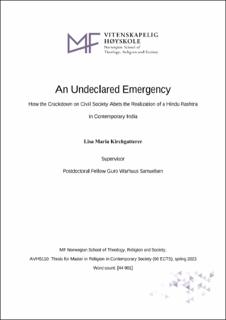An undeclared emergency : how the crackdown on civil society abets the realization of a Hindu Rashtra in contemporary India
Master thesis
Permanent lenke
https://hdl.handle.net/11250/3097236Utgivelsesdato
2023Metadata
Vis full innførselSamlinger
Sammendrag
Since 2014, India has been governed by the Hindu nationalist Bharatiya Janata Party under prime minister Narendra Modi. During their tenure, India has become significantly politically polarized and has regressed to be one of the worst autocratizing states in the world. One of the top ten indicators of autocratization is the repression of civil society. Against this background, this thesis investigates how restrictions for civil society have contributed to Hindu nationalist power assertion since 2014. The main interest is how restriction patterns for non-governmental organizations and related individuals reflect the Hindu nationalist ideology, how consequences of restrictions benefit the realization of a Hindu nation, and how the restrictions influence the relationship between the state and civil society.
The thesis builds on 15 semi-structured interviews with people working in Indian NGOs and two weeks of job shadowing in one of the organizations. My analysis shows that voices advocating for secularism, religious, gender, and caste rights as well as minority religious charities, experience harsher forms of repression because their activities are seen as a threat to the Hindu nationalist project. The resulting scenario of reduced diversity in civil society and the public sphere more broadly is again a development likely to favor the growth and entrenchment of Hindu nationalism. In the thesis, I demonstrate that while civil society actors actively resist these developments by forging alliances and attempting to build a political counternarrative based on constitutional principles, dwindling ties with local communities as well as unaddressed internal hegemonies, are factors that complicate these efforts.
